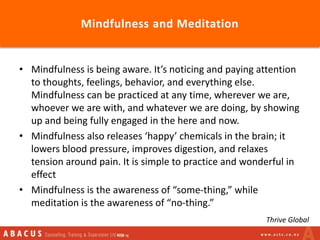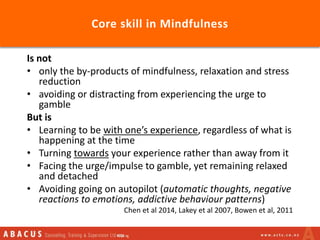
Mindfulness para el gamble -
Skip to main content. Home Drugs. Gambling - how to regain control. Actions for this page Listen Print. Summary Read the full fact sheet. On this page. Strategies for change Self-exclusion Gambler's Help Talk about lying Relax and look after yourself Prepare for a lapse What to do if you feel like gambling Where to get help.
Strategies for change Suggestions include: Set goals — setting short-term and long-term goals may help you to stay focused and clear about cutting down or giving up gambling. Avoid high-risk situations — such as the use of credit cards, taking out loans, carrying large amounts of money with you, using gaming venues for socialising, or gambling as a reaction to emotions.
These behaviours will weaken your resolve to control or stop your gambling. Talk about it — talking about gambling with somebody you trust and someone who won't judge you can ease the pain of bottling it up.
It can also reduce the stress that can cause you to continue to gamble. Find alternatives to gambling — There are two major risk factors why people continue to gamble, social isolation and leisure substitution. When people stop gambling they lack motivation to find other activities that are exciting and fun and they lost family and friends who could support them in engaging in such activities.
Self-exclusion Self-exclusion is a free program where you ban yourself from gambling venues or online gambling. A counsellor may be able to help you with your strategies, which may include: muscular relaxation training exercise sport yoga meditation. Prepare for a lapse A lapse occurs when you gamble again after deciding to stop.
What to do if you feel like gambling When you feel like you might gamble again, or if you do gamble again, helpful strategies include: Talking to your support person. Writing your feelings and actions in your gambling diary. If you gambled, look at what happened and see if you can spot ways of stopping it next time.
Look for the positives too. Did cash limits help? Healing Spring Monastery 2 Rue Pascal Jardin Verdelot France. EIAB Schaumburgweg 3 D Waldbröl Germany. AIAB Lotus Pond Temple Ngong Ping Lantau Island Hong Kong. Blue Cliff Monastery 3 Mindfulness Road NY Pine Bush New York United States.
Deer Park Monastery Melru Lane Escondido California United States. Magnolia Grove Monastery Towles Rd Batesville Mississippi United States. Thai Plum Village Pong Ta Long Pak Chong District Nakhon Ratchasima Thailand.
Stream Entering Monastery Porcupine Ridge Road VIC Porcupine Ridge Australia. Mountain Spring Monastery Bells Line of Road Bilpin New South Wales Australia. The Five Mindfulness Trainings PDF — Download.
Read more The Mindfulness Survival Kit Five Essential Practices. Email Address. First Name. Last Name. Hide Transcript. What is Mindfulness Thich Nhat Hanh January 15, There was a problem reporting this post. Harassment Harassment or bullying behavior. Inappropriate Contains mature or sensitive content.
Misinformation Contains misleading or false information. Offensive Contains abusive or derogatory content. Suspicious Contains spam, fake content or potential malware. Report note.
Please confirm you want to block this member. You will no longer be able to: Mention this member in posts Message this member Please allow a few minutes for this process to complete.
You have already reported this. Finally, we are grateful to AFIP Associação Fundo de Incentivo à Pesquisa for the infrastructure support. Browse Subject Areas? Click through the PLOS taxonomy to find articles in your field. Article Authors Metrics Comments Media Coverage Reader Comments Figures.
Introduction Around Methods Study design This is a randomized clinical trial study, non-blinded, controlled, with pre-post intervention comparison. Download: PPT.
Study setting The participants were in a closed treatment for SUDs in a Therapeutic Community TC , where people with SUDs stayed voluntarily or involuntarily to recover from the disorder in a controlled environment during a limited period [ 3 ]. Eligibility criteria The Therapeutic Community is restricted to individuals with a substance use disorder referred to inpatient treatment by social services, health services or even by themselves.
MBRP fidelity MBRP sessions were recorded with a recorder without internet access and were evaluated by an independent reviser. Recruitment The recruitment process happened from July to December Measures Research assistants administered the questionnaires and the behavioral tests after receiving training from APGD.
Each approach was conducted on different days and weeks, and the sequence of the measures was: Self-report measures. Behavioral tasks. Procedure The protocol had three phases: 1. Data management Data management. Data analysis. Results Demographic characteristics A total of participants consented to participate in the randomized controlled trial.
Table 1. Sociodemographic and substance use information of participants at baseline. Table 2. IGT IGT results are shown in Table 3. Table 3. GLM of Iowa gambling test IGT , self-report impulsivity UPPS-P and stroop color task.
UPPS-P UPPS-P results are shown in Table 3. Stroop test Stroop results are shown in Table 3. Discussion The literature on impulsivity has already pointed out the challenge of measuring and understanding this construct, which leads to difficulty in intervening on it.
Strengths The use of multifaceted instruments in the study favored our understanding of this phenomenon involving dependence and impulsivity. Conclusion This study contributed for improvement in executive functions, specifically decision-making and no effect for self-reported impulsivity and inhibitory control among middle-aged patients after an 8-weeks intervention of MBRP protocol in an inpatient setting.
Supporting information. S1 Checklist. s DOC. S1 File. Appendix study protocol—version EN-PT. s DOCX. Acknowledgments We are grateful for the voluntary participation of the participants in this study as well as by the employees of the institutions that have made it possible.
References 1. Drug Use and Health Consequences. In: World Drug Report Bastos FI. III Levantamento Nacional sobre o uso de drogas pela população brasileira. View Article Google Scholar 3.
Félix-Junior I, Donate AP, Noto AR, Galduróz JC, Simionato NM, Opaleye ES. Mindfulness-based Interventions in inpatient treatment for SUDs: a systematic review.
Addictive Behaviors Reports. View Article Google Scholar 4. Evren C, Durkaya M, Evren B, Dalbudak E, Cetin R. Relationship of relapse with impulsivity, novelty seeking and craving in male alcohol-dependent inpatients. Drug Alcohol Rev. Moeller FG, Barratt ES, Dougherty DM, Schmitz JM, Swann AC.
Psychiatric aspects of impulsivity. American Journal of Psychiatry. Whiteside SP, Lynam D, Miller J, Reynolds S. Validation of the UPPS Impulsive Behavior Scale: A four factor model of impulsivity.
Eur J Pers. View Article Google Scholar 7. Perry JL, Carroll ME. The role of impulsive behavior in drug abuse. Argyriou E, Um M, Carron C, Cyders MA. Age and impulsive behavior in drug addiction: A review of past research and future directions. Understanding the construct of impulsivity and its relationship to alcohol use disorders.
Addiction Biology. Sediyama CYN, Moura R, Garcia MS, da Silva AG, Soraggi C, Neves FS, et al. Factor analysis of the Brazilian version of UPPS impulsive behavior scale. Front Psychol. View Article Google Scholar Noël X, Van Der Linden M, Bechara A. The Neurocognitive Mechanisms of Decision-making, Impulse Control, and Loss of Willpower to Resist Drugs.
Psychiatry Edgmont. Tang YY, Hölzel BK, Posner MI. The neuroscience of mindfulness meditation. Bowen S, Chawla N, Collins SE, Witkiewitz K, Hsu S, Grow J, et al.
Mindfulness-based relapse prevention for substance use disorders: A pilot efficacy trial. Subst Abus. Baer RA. Mindfulness training as a clinical intervention: A conceptual and empirical review. Clinical Psychology: Science and Practice.
Bishop SR, Kraemer HC, Turner JA, Anderson ML, Balderson BH, Cook AJ, et al. Mindfulness: A Proposed Operational Definition. Gallo GG, Curado DF, Opaleye ES, Donate APG, Scattone VV, Noto AR.
Impulsivity and Mindfulness among Inpatients with Alcohol Use Disorder. Subst Use Misuse. Hemenway M, Witkiewitz K, Unrod M, Brandon KO, Brandon TH, Wetter DW, et al.
Development of a mindfulness-based treatment for smoking cessation and the modification of alcohol use: A protocol for a randomized controlled trial and pilot study findings.
Contemp Clin Trials. Witkiewitz K, Greenfield BL, Bowen S. Mindfulness-based relapse prevention with racial and ethnic minority women. Addictive Behaviors. Davis JP, Barr N, Dworkin ER, Dumas TM, Berey B, Diguiseppi G, et al. Effect of Mindfulness-Based Relapse Prevention on Impulsivity Trajectories Among Young Adults in Residential Substance Use Disorder Treatment to a tendency towards rapid or unplanned action with a.
Mindfulness N Y. Carpentier D, Romo L, Bouthillon-Heitzmann P, Limosin F. Yaghubi M, Zargar F, Akbari H. Comparing Effectiveness of Mindfulness-Based Relapse Prevention with Treatment as Usual on Impulsivity and Relapse for Methadone-Treated Patients: A Randomized Clinic al Trial.
Chan AW, Tetzlaff JM, Altman DG, Laupacis A, Gøtzsche PC, Krleža-Jerić K, et al. SPIRIT statement: Defining standard protocol items for clinical trials. Yiulin W, Fan L, Yuting D, Zhaoxiang B, Chi Z, Yaolong C.
CONSORT-SPI explanation and elaboration: Guidance for reporting social and psychological intervention trials. Chinese Journal of Evidence-Based Medicine. Vanderplasschen W, Colpaert K, Autrique M, Rapp RC, Pearce S, Broekaert E, et al.
Therapeutic Communities for Addictions: A Review of Their Effectiveness from a Recovery-Oriented Perspective. Pompeia S, Inacio LM, de Freitas RS, Zanini GV, Malloy-Diniz L, Cogo-Moreira H. Psychometric properties of a short version of the impulsiveness questionnaire UPPS-P in a Brazilian adult sample: Invariance for effects of age, sex and socioeconomic status and subscales viability.
Strauss E, Sherman E, Spreen O. Executive Functions. In: Strauss E, Spreen O, editors. A Compendium of Neuropsychological Tests Administration. Third Edition. Oxford University Press; Fernández-Serrano MJ, Pérez-García M, Schmidt Río-Valle J, Verdejo-García A.
Neuropsychological consequences of alcohol and drug abuse on different components of executive functions.
Journal of Psychopharmacology. Verdejo-García A, Bechara A, Recknor EC, Pérez-García M. Executive dysfunction in substance dependent individuals during drug use and abstinence: An examination of the behavioral, cognitive and emotional correlates of addiction.
Journal of the International Neuropsychological Society. De Wilde B, Bechara A, Sabbe B, Hulstijn W, Dom G. Risky decision-making but not delay discounting improves during inpatient treatment of polysubstance dependent alcoholics.
Front Psychiatry. R Core Team. R core team R: A language and environment for statistical computing. R Foundation for Statistical Computing, Vienna, Austria.
E systematic review Mindfulness para el gamble meta-analysis by Maynard et al. The Mindfulnes studies assessed the effects of mindfulness-based interventions in the treatment of adults with disordered gambling. Thirteen studies between and met criteria for the review and seven met criteria for meta-analysis. Control groups included a wait-list control, group CBT, TAU, GA, imaginal relaxation and aversive therapy. Participants included a total of gamblers. Mindfulness para el gamble your gambling is causing harm, Mincfulness Mindfulness para el gamble Emocionantes victorias en el juego you can do Mindfukness stop it being ggamble issue. You can take steps to change your Mindfuoness. You can ban yourself from venues like casinos, clubs, pubs or TABs, or from placing a bet on gambling websites. By law, Australian gambling providers must give customers the option to self-exclude from their venue or products. All Gambler's Help services are free and confidential. Call now for support, 24 hours a day, 7 days a week: Tel: This usually leads them further into debt.
die Frage ist gelöscht
Diese sehr wertvolle Meinung
Es ist die einfach bemerkenswerte Antwort
Es kommt mir ganz nicht heran.
Sehr die nützliche Information